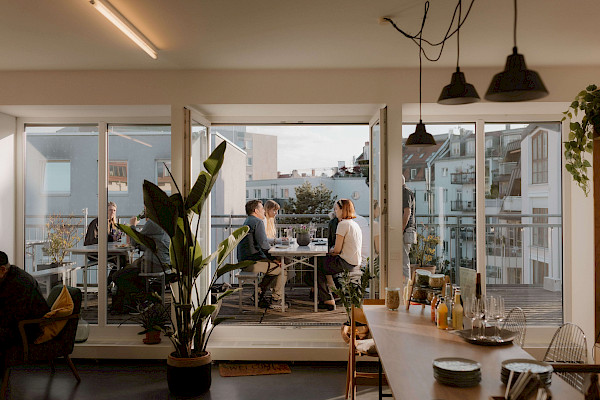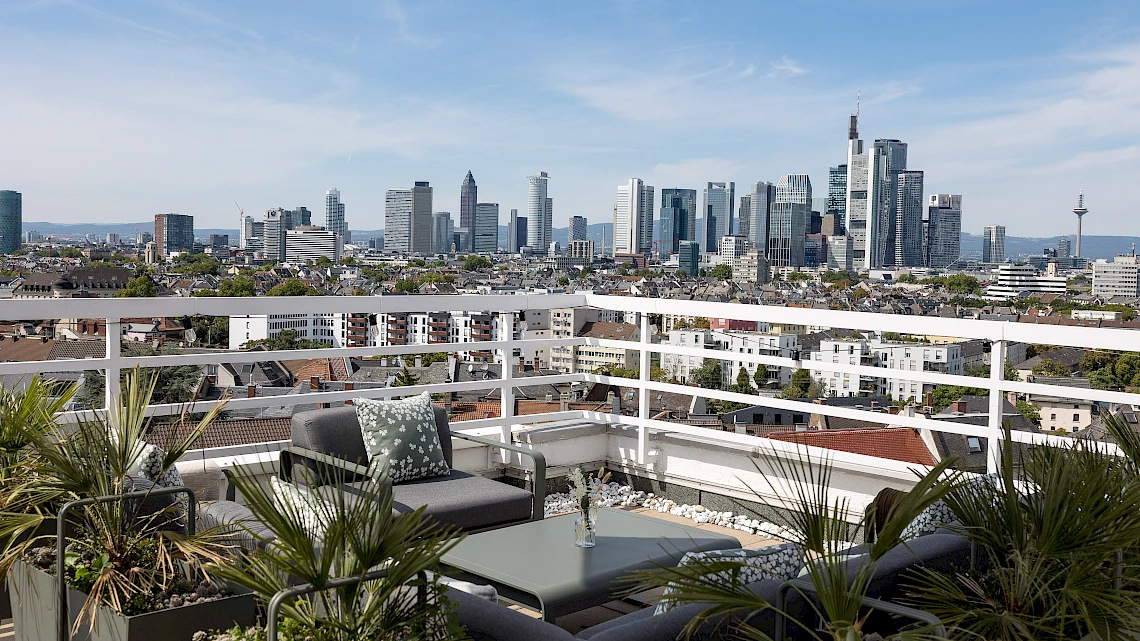Event planning: The right concept for a successful event
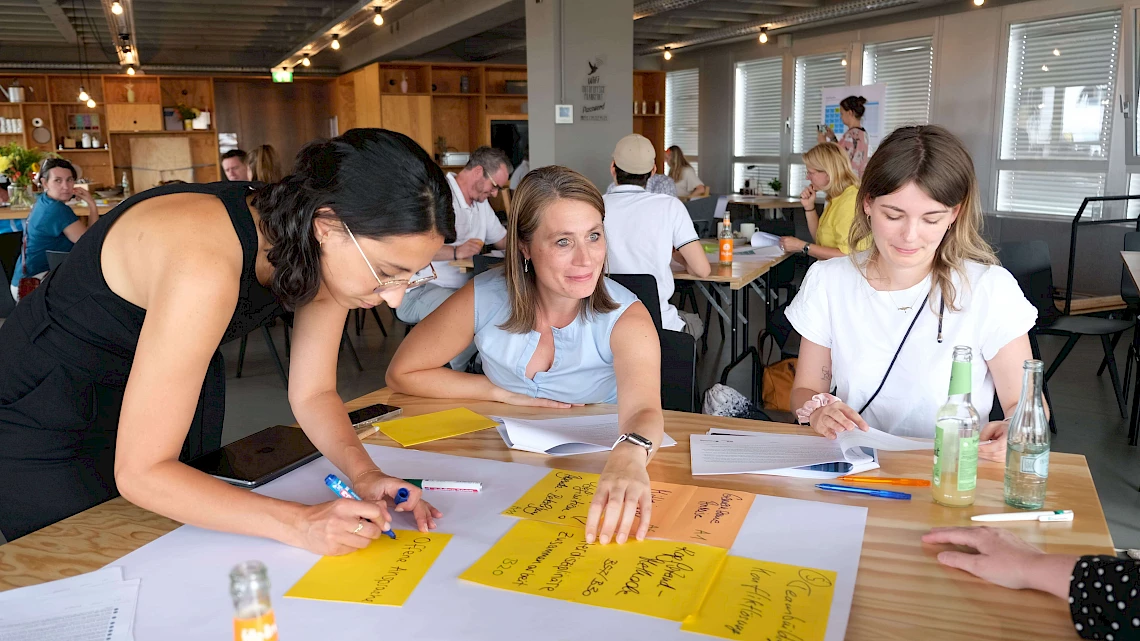
An event can be many things: a lavish party, an inspiring conference, a team-building highlight or a product presentation that will live long in the memory. But behind every successful event is more than just a good idea - it requires careful event planning and a well thought-out event concept that brings all the threads together.
Especially in times of rising expectations and numerous trends, it is more important than ever to approach the planning of an event professionally. Because without a clear structure, a creative thread and solid organization, even the most exciting event idea runs the risk of ending in chaos.
In this article, we'll show you why well-thought-out event planning is the key to a successful event, what makes a good event concept and how you can turn your event into an unforgettable experience step by step. We'll also tell you which trends are shaping the industry - and how to avoid classic mistakes.
By the way: If you're looking for a special location for your next event, we at OutOfOffice have a few exciting tips for you!
Why no event can be successful without an event concept
Whether you are planning a small corporate event or a large gala, an event stands and falls with event planning. Many people underestimate how complex it can be to professionally implement an event from the initial idea to the grand finale. After all, good event planning means much more than just setting the date, location and number of guests.
The first step in any successful event is a clear concept for the event. It is the heart of the planning and gives your event a clear direction. It helps you to maintain an overview, bring everyone involved together and find the right service providers. Without a solid concept, a lot is left to chance - and that can be expensive and stressful.
A good event concept answers fundamental questions:
- What is the aim of my event?
- Who is my target group?
- What message do I want to convey?
- What atmosphere do I want to create?
- What are my budget limits?
The clearer these questions are answered, the more targeted you can plan your event. A concept also gives you the security of being able to react quickly in the event of unforeseen challenges.
By the way: good event planning doesn't just make your guests happy - it also ensures that you can enjoy your event yourself because you know that all the details are perfectly prepared.
Want to know how to develop a strong concept? Then read on in the next section!
Developing an event concept: The creative basis for successful event planning
A successful event always starts with a clear vision - and this is created when you conceptualize your event. It is the creative blueprint of your event and forms the basis on which you build all further steps of your event planning. Without a well thought-out concept, even the best idea can end in chaos or miss its target.
But what exactly goes into a good event concept? Here are the most important points that you should definitely consider:
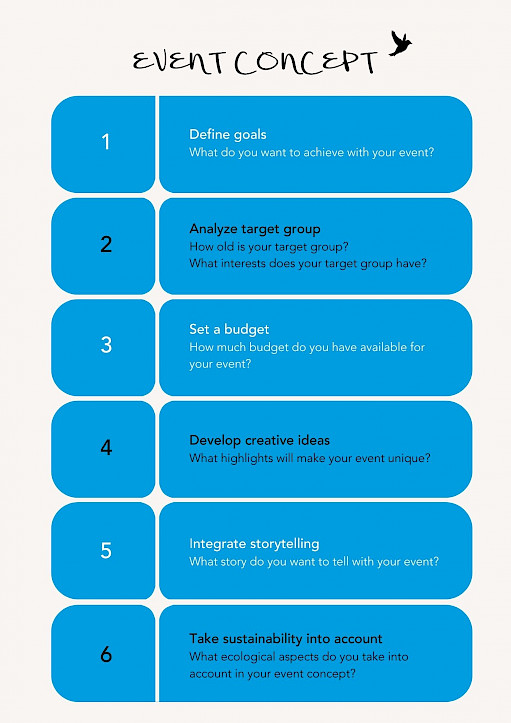
1. Define goals
What do you want to achieve with your event? Is it about team building, presenting a new product, retaining customers or simply having a good time together? Clear goals will help you to align all further decisions in your event planning.
2. Analyze the target group
An event for employees is fundamentally different from an event for business customers. The age, interests, expectations and composition of the guests are decisive for how you design your event. The concept of your event should be tailored precisely to these people.
3. Set a budget
Without a realistic budget, even the best event planning will come to nothing. Define how much you can spend on the location, catering, technology, program and decorations - and be sure to plan a buffer for unforeseen costs.
4. Develop creative ideas
This is where the fun comes in! Think about what highlights could make your event unique. An unusual motto, an exciting location, interactive elements or special artists can make your event a talking point. A good event concept combines creative ideas with practical feasibility.
5. Integrate storytelling
The best events tell a story. They take guests on a journey and create emotional moments. Think about a common thread that runs through the invitation, decorations, program and catering. This will make your event planning a well-rounded affair.
6. Take sustainability into account
Sustainability is no longer a trend, but often an expectation. A modern event concept considers ecological aspects - from regional catering and reusable materials to carbon offsetting measures.
A well thought-out concept for events is therefore much more than just a few notes. It gives you security, helps you communicate with service providers and ensures that your event is not only organized, but also inspiring.
Curious about how to put your concept into practice step by step? Then move on to the next section!
Event planning step by step: from vision to perfect implementation
A great event concept is the beginning - but it's the implementation that turns it into an event that delights guests. To turn your vision into reality, you need a structured event plan. Here you will find the most important steps that will guide you safely through the entire planning process:
1. Set a timeline and milestones
Start with a clear time frame. Create a timeline in which all essential tasks are recorded: Concept development, booking the location, invitations, technical check, decorations, catering, rehearsals and much more. This will help you avoid last-minute stress and always keep an overview.
2. Choose the right location
The location has a major influence on the atmosphere of your event. Whether creative workshop rooms, an urban loft or a roof terrace with a skyline view - choose a location that suits the concept of your event. Pay attention to capacity, technical equipment, transport connections and flexibility of use.
Are you looking for an exciting location? We can help you here. OutOfOffice offers five extraordinary locations in Frankfurt, Munich and Stuttgart. What makes the locations so unique? Each location has been furnished and equipped according to a unique concept. The locations fit perfectly into the surroundings, the district in which they are located. So after a day's meeting, you feel as if you have been in the middle of the city and have really seen the city and its sights.
And the highlight: all locations are equipped with a spacious roof terrace that offers a fantastic view over the rooftops and sights of the city. Here is an overview of our locations:
Our event locations in Frankfurt
- OutOfOffice Sachsenhausen - our creative workshop with a skyline view in Frankfurt Sachsenhausen
- OutOfOffice Westend - our green oasis near the Palmengarten in Frankfurt
- OutOfOffice Eisbach - our surfer's paradise with a view of the surfers on the Eisbach wave in Munich
- OutOfOffice Glockenbachviertel - our creative studio in the lively Glockenbachviertel district of Munich
Our event locations in Stuttgart
- OutOfOffice Stuttgart - our creative studio with a view of the old town that combines two worlds
- Event location Stage - The perfect stage for lectures, presentations and conferences with a relaxed beach area
- Event location Studio - The ultimate fit for meetings, workshops and break-out sessions with jungle vibes
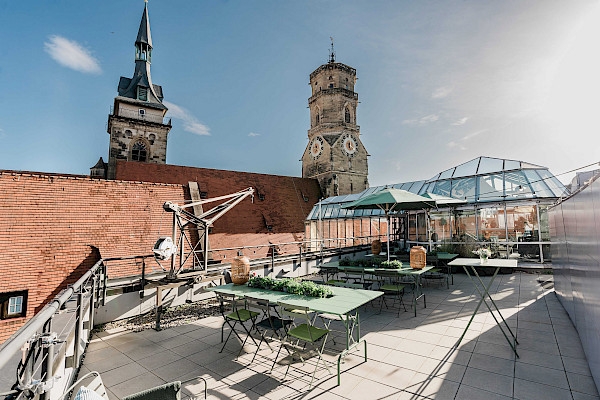
Event location OutOfOffice Stuttgart
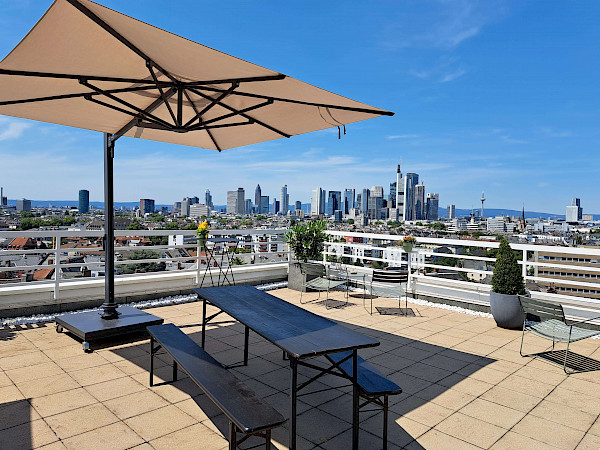
Event location OutOfOffice Sachsenhausen (Frankfurt)
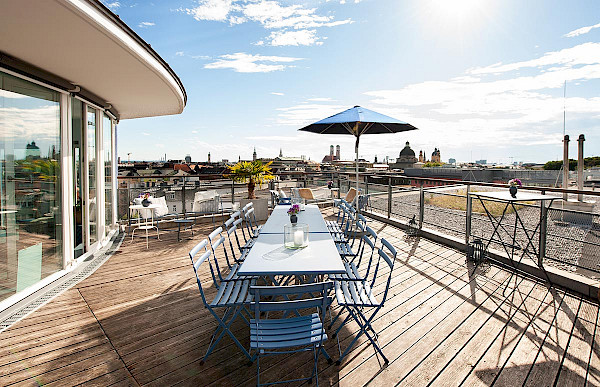
Event location OutOfOffice Eisbach (Munich)
3. Coordinate service providers and partners
Good event planning stands and falls with reliable partners. Technology, catering, artists, photographers or moderators - clarify the details early on, obtain quotes and check references. Regular coordination avoids misunderstandings and ensures quality.
4. Organize technology, catering, decoration and program
- Technology: From sound and lighting to live streaming - depending on the size of the event, professionals need to be involved.
- Catering: Whether flying buffet, seated dinner or food trucks - the culinary offer should match the concept.
- Decoration: Colors, materials, lighting and small details provide the common thread and create atmosphere.
- Program: Music, speeches, games or workshops - varied content keeps guests entertained.
5. Plan communication with participants
Communication with your guests should start before the event. Save-the-date, invitations, reminder emails and information on arrival or the dress code are all part of professional event planning. Clear announcements or digital tools also ensure that everything runs smoothly during the event.
6. Prepare a plan B
Unforeseen things can always happen - be it bad weather, technical problems or illness. A good plan B is the backbone of any professional event planning. This allows you to react flexibly without having to completely overturn your event.
With a structured approach, you can plan your event without stress and pressure. This leaves more room for creativity and turns your event into an unforgettable experience - for you and your guests.
Event concept and event planning: two partners for a successful event
When it comes to events, many people first think of elaborate decorations, great locations or spectacular show acts. But what really determines whether an event is a success is the interplay between the event concept and event planning. These two elements are inseparable - just like the stage and the lighting that sets the scene perfectly.
The concept of an event provides the vision, the creative idea and the strategic basis. It defines the goal, the message and the experience you want to offer your guests. It answers questions such as:
- What story do I want to tell?
- What emotions do I want to arouse?
- How does everything fit together - location, program, catering, decoration?
However, no matter how great a concept is, it remains just a nice theory if it is not implemented professionally. This is where event planning comes into play. It ensures that your concept becomes reality - on time, on budget and thought through down to the last detail. It is the structure behind the creativity.
Important points that show how concept and planning go hand in hand:
1. Dovetailing objectives and measures
A good concept defines clear goals. Planning the event breaks these goals down into concrete measures: Location research, service provider briefings, schedules, budget control. The event will only be a success if both sides work together.
2. Plan for flexibility
Even the best planning cannot foresee everything. A strong event concept therefore offers enough flexibility to allow you to react creatively to last-minute changes. Event planning, in turn, ensures that a plan B is available without diluting the overall concept.
3. Coordinate communication
The concept specifies how you want to communicate - e.g. elegant, relaxed, innovative. The event planning implements this: with invitations, during the event and in the follow-up. This ensures that the message remains consistent and coherent.
4. Design guest guidance
A concept defines how guests should feel and move. Planning ensures clear paths, schedules and smooth processes so that the vision can actually be realized.
When the event concept and event planning work together perfectly, the result is an event that is not only organized, but also inspiring. Guests feel that everything has been thought through down to the last detail - and enjoy an experience that they will remember for a long time to come.
Common mistakes in event planning - and how to cleverly avoid them
Even the most experienced planners are not safe from them: small and large mishaps that can quickly turn good event planning into a stressful adventure. The good news is that many of these pitfalls can be avoided with a little attention and solid preparation. Here you can find out what the classic mistakes are when planning an event - and how to avoid them.
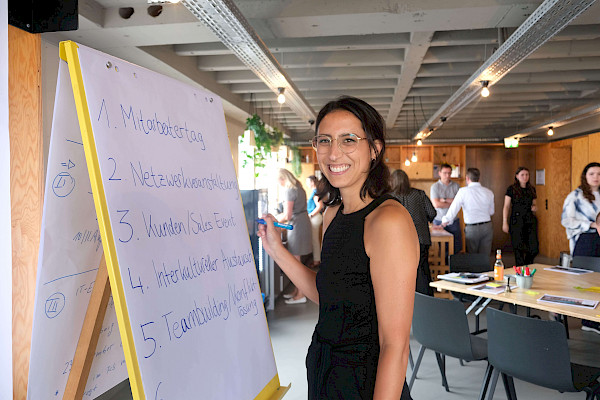
1. Unrealistic schedules
People often underestimate the time and effort required for an event. Whether it's approvals, delivery times for technology or coordination with many people involved - everything usually takes longer than expected. So start early and build a sufficient buffer into your schedule. Structured event planning ensures that you keep your nerve.
2. Lack of target definition
If you don't know what you want to achieve with your event, you are planning into the blue. Define clear goals right from the start and check every planning step to see whether it supports them. This way, the concept of your event remains consistent and well thought out.
3. Budget pitfalls
Spontaneous special requests, hidden costs or unforeseen expenses can quickly blow the budget. Create a detailed cost breakdown and plan at least 10-15% in reserve for unforeseen expenses. This will help you keep control of your event planning finances.
4. Communication gaps
Missing or unclear agreements with service providers, the location team or within your own organization team often lead to chaos. Document all agreements in writing and hold regular consultations. Transparent communication is the key to planning a successful event.
5. No flexibility for plan B
No matter how perfectly you have worked out your event concept - something can always go wrong. Technology fails, the weather doesn't cooperate, a service provider cancels. Work out alternatives in advance and discuss them with everyone involved. That way, you'll be prepared in an emergency.
6. Not keeping an eye on guests
Events are made for people. If you focus too much on organizational details, you sometimes forget the guests' perspective. Think about what your audience expects, needs and finds pleasant at every step of planning your event.
Mistakes happen - that's normal. But with thorough preparation, clear communication and well thought-out event planning, your event will be an experience that everyone will remember fondly.
Event planning and trends: What makes modern events successful today
The world of event planning is changing rapidly. Guests have long expected more than just a nice ambience and good food. They want experiences that inspire, stories that touch them and events that leave a lasting impression. To help you keep your finger on the pulse at your next event, we have compiled the most important trends that are currently shaping the planning and concept of events.
1. Sustainability and green events
Sustainability is no longer an optional extra in event planning, but a must. Guests and companies are placing more and more importance on organizing events in an environmentally friendly way. This applies to the choice of regional suppliers, plastic-free decorations, CO₂ compensation and digital invitations instead of printed cards. A sustainable event concept is a real image booster.
We at OutOfOffice also consistently focus on sustainability. We have been climate-neutral since 2021 and pay particular attention to regionality and ecological responsibility when working with our service providers and partners. That's why we not only offer sustainable and regional catering, but also use environmentally friendly materials to ensure an all-round green event experience. We also work with the non-profit organization OlivaMi to offset our excess carbon footprint, which we cannot avoid through sustainable measures.
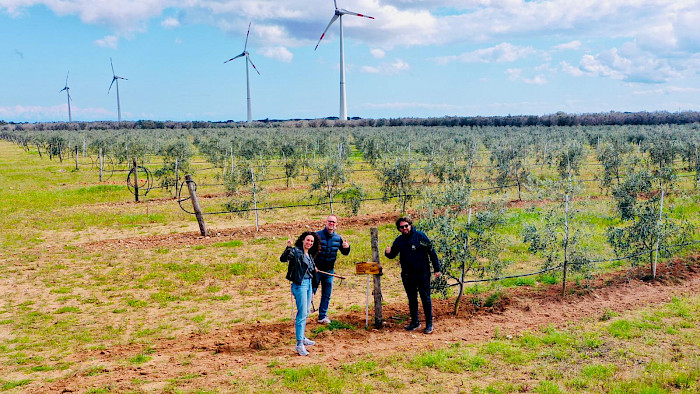
You can find out more about our sustainability concept and our project with OlivaMi here: Sustainability at OutOfOffice
2. Digitalization and hybrid events
The pandemic has shown how important flexible formats are. Hybrid events - a mixture of in-person and online participation - are now an integral part of event planning. They extend the reach and make it possible to involve guests regardless of their location. Live streams, virtual workshops and digital interaction tools have become an integral part of modern event concepts.
Incidentally, all of our OutOfOffice locations in Frankfurt, Munich and Stuttgart are equipped with state-of-the-art technology. This makes it easy to implement hybrid events, live streams or virtual workshops - for events that work perfectly both on site and digitally.
3. Experience orientation and storytelling
People love stories. That's why more and more event organizers are focusing on consistent storytelling, from the invitation to the decorations to the program. Experience-oriented concepts for events ensure that guests not only absorb information, but also feel emotions - and that is exactly what they remember.
4. Personalization instead of a standard programme
Standard events are becoming increasingly less attractive. Guests want individually tailored experiences that take their interests and needs into account. In modern event planning, this means tailor-made content, flexible program modules and small, personal details that make the event special.
5. Innovative locations and unusual settings
The choice of location is also playing an increasingly important role. Guests love exciting places that surprise them - be it an industrial loft location, a green oasis in the middle of the city or a rooftop terrace with a view of the skyline. Locations such as our OutOfOffice rooms in Frankfurt, Munich and Stuttgart offer creative settings that perfectly complement any event concept.
To our creative workshop: OutOfOffice Sachsenhausen (Frankfurt)
To our green oasis: OutOfOffice Westend (Frankfurt)
To our surfer's paradise: OutOfOffice Eisbach (Munich)
To our creative atelier: OutOfOffice Glockenbachviertel (Munich)
To our creative studio: OutOfOffice Stuttgart
6. Interactive elements and engagement
A modern event thrives on participation. Interactive formats such as live surveys, workshops, escape games or creative craft stations increase attention and create real experiences. Guests are transformed from audience members into active participants - and this is exactly what makes events successful today.
At OutOfOffice, we also focus on experience instead of boredom. We offer a wide range of event activities - from creative art nights and mini golf on the roof terrace to cocktail workshops and exciting live cooking events. Simply get in touch with us and together we will create an event that will leave a lasting impression on your guests.
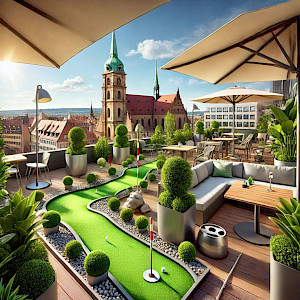


Event planning is therefore becoming increasingly complex, but also more exciting. Those who know the current trends and integrate them into their event concept create events that are not only well organized but also unforgettable. And that is precisely the goal of every successful event.
